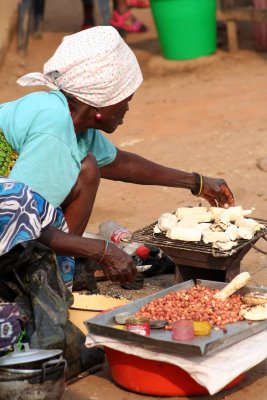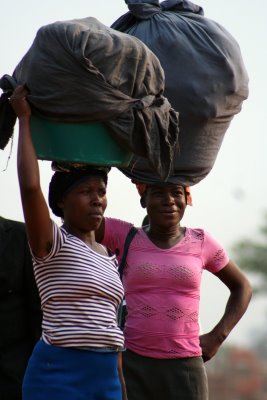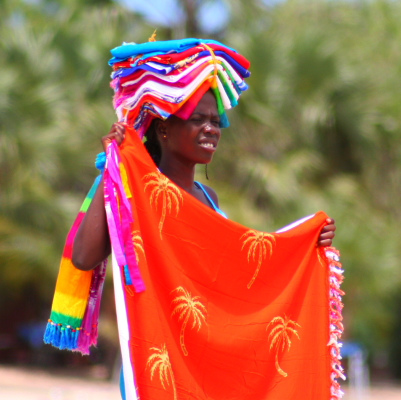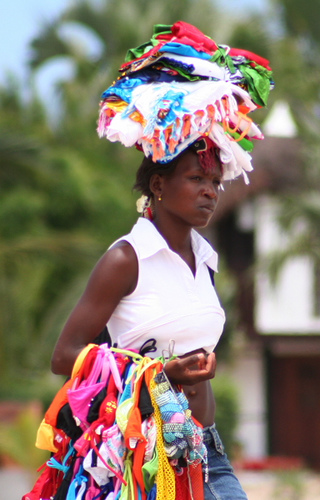
“She has to take her baby with her, while walking around Luanda selling various things. In Luanda, we call them “zungueiras“. Foto “Lady and her baby” by Jose Carlos Costa [1], published with the photographer's permission.
Around the streets of Luanda city, we see humble and determined eyed zungueiras. They walk around the city come rain or shine. Some of them carry their babies on their backs, at the same time they bear the weight of the goods they sell. It may be the sweet fruit, like sugar apples, scented mangoes, or hope-colour avocados, which these women insist on preserving, or ham and cheese sandwiches. Other goods, such as shoes, school books or fish, are also among the products these fighters and breadwinners choose to sell.
Jorge Ramos, from Jorginho em Angola [2] [pt] blog, proves this by writing about the zungueiras from the beautiful Mussulo peninsula:
“As zungueiras são as milhares de angolanas que saem às ruas vendendo todo o tipo de mercadorias que carregam na cabeça mesmo. Essas zungueiras do Mussulo atendem a um público específico e oferecem produtos como roupas de praia, batas e peças inteiras de panos multicoloridos, ricamente estampados com figuras africanas e linhas geométricas, bem ao gosto do padrão daqui. Elas caminham o dia todo, sob o sol escaldante. É absolutamente incrível a capacidade das zungueiras em equilibrar sobre a cabeça balaios, sacos, cestos, bacias e sacolas onde transportam as mercadorias que vendem. Desafiando as leis da física, o frágil equilíbrio se impõe perante vários obstáculos que se interpõem ante elas nas ruas e calçadas além dos filhos pequenos, que carregam nas costas, atados por panos que amarram na frente à altura do peito. Milhares de zungueiras percorrem a cidade, o dia todo, de um ponto a outro de Luanda, arriscando-se muitas vezes em meio ao tumultuado trânsito.”

“Women in the “zunga” are those who survive from hawking goods. It is an alternative to hunger in a country where there are few jobs. But in Africa, even this is aesthetic, colourful”. Zungueiras, photo by wilsonbentos [3], published with the photographer's permission.
The hellish traffic that reigns over Luanda is the least of the evils these women face. The economic police who go around the city looking for law breakers are characterized by the harsh and austere tone in which they address the street vendors. The relationship between the economic police and zungueiras is far from friendly. Many hawkers complain about the way those individuals act, especially considering that the majority take their money and goods, which means for them humiliation and a hole in the family budget.
The government is trying to put an end to hawking and intends to build proper markets to house the zungueiras. If this goal is met, will Luanda be the same? The city will lose the colourfulness and the pleasure of watching the sway of these warrior women and the colorful bowls in which they carry their daily survival kits.
Filmmaker Marisol Kadiegi devotes a well deserved space to the zungueiras of Luanda and of other parts of the country on the Angola de Todos Nós [4] blog [pt]:
“Elas saíram do Uíge, Malange, Benguela, enfim! De todas as províncias de Angola para na capital do país, tentarem uma vida melhor e em busca de sonhos, tentar ver seus filhos “doutores”. Castigadas pela guerra, herdaram da mamã quitandeira a arte de vender, da palavra “zunga” originária do kimbundo, ela se tornou andarilha, andante ou vagante. Essa dita senhora é a nossa zungueira, mulher batalhadora que muito antes do sol, se levanta para tratar da vida e conseguir alimento para o seu sustento. Assim como uma leoa, caça comida para seus filhos enquanto o “rei” leão descansa. A nossa vendedora que de porta em porta e nas ruas da cidade sai oferecendo o seu produto, fazendo do lamento um grito. Na maioria das vezes, levando o filho caçula nas costas, dá um kilape (crédito) às freguesas habituais e carrega no rosto um sorriso na esperança de um dia ver-se totalmente liberta da sua condição.
Vítima de violência da polícia e muitas vezes por parte dos próprios companheiros, a mulher zungueira é exemplo de dignidade.”
“They have left Uíge, Malange, Benguela, you name it! They came from all of the Angolan provinces to the country's capital to try for a better life and in search of their dreams, hoping to see their kids becoming “doctors”. Punished by the war, they have inherited from their greengrocer mothers the art of selling (sell from the kimbundo [5] word “zunga”), they have become hikers, walkers and vagrants. Said ladies are our zungueiras, warrior women who get up before the sun to deal with life and pursue their living. Just like lionesses, they hunt for food for their kids while the “king” lion rests. Our street vendors, who knock on door after door and go about the city offering their products, make a shout from a lament. Most times, they carry their youngest kid on their backs, give kilape (credit) to their regular customers and wear a smile on their faces hoping that one day they will see themselves set completely free from this condition.
Victims of violence and police, and often from their own partners, the zungueira women are an example of dignity.”
 [6]
[6]
“Women working”, photo by Jose Carlos Costa [1], published with the photographer's permission
Dignity and courage are two good adjectives to describe these women. Due to the lack of information and poverty, many Angolan women see themselves forced to fall into an ambulant life. Jorge Ramos [2] tells us a little about the zungueiras‘ daily life:
“Quando cansam, param e se sentam nas calçadas onde amamentam seus bebés e tiram alguma fruta dos seus alforjes para se alimentarem. Às vezes é numa esquina movimentada, mas já vi uma zungueira em pleno centro da cidade parar num calçadão, baixar seu balaio de peixe salgado e ressequido e dar meio abacate para o filho pequeno que se lambuzava, bem na porta de uma moderna agência de um banco europeu, num belo contraste cultural. Idiossincrasias da globalização, que não comporta vertentes antropológicas nem aspectos humanistas em sua inexorável marcha, por isso nessa minha breve leitura contento-me em apenas analisar o episódio sob o prisma da plasticidade da cena e seu significado. Com as elevadas taxas de desemprego e o escasso acesso a uma formação escolar ou profissional ser zungueira é a actividade que mais absorve jovens angolanas pobres, geralmente mães solteiras, algumas recém saídas da adolescência.”







The photos above have been taken by Marcelo Frota, and are reproduced here with the photographer's permission. See his Flickr photostream [7] and his Angola's album on Picasa. [8]